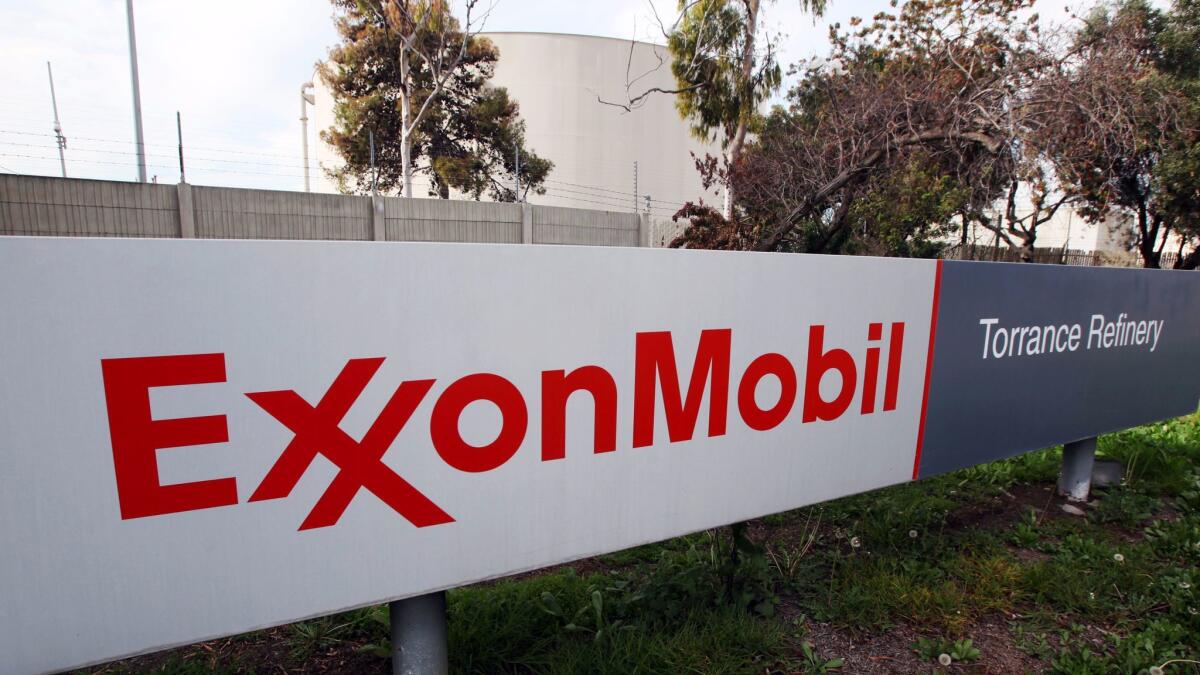Editorial: California’s next attorney general should put the Exxon Mobil case high on his list

- Share via
Scientists at the giant multinational energy company then known as Exxon were aware as early as the 1970s that burning products made from oil would contribute to global warming and, eventually, raise sea levels and alter climates.
Investigative reports published in 2015 by The Times and Inside Climate News found that the company made internal calculations about how such changes would affect its business — recognizing, for instance, that the polar ice caps were shrinking and that the company’s operations in the Arctic could change dramatically as a result. But even as it privately schemed about how to handle the risks and benefits of climate change, the oil giant publicly argued that the science it knew to be right was actually murky. For years, Exxon financed projects aimed at undermining the growing scientific consensus about global warming, and continued to sell stock to investors without acknowledging either the dangers to the world of burning fossil fuels — or the threats that rising and more volatile seas posed to the company’s own offshore drilling operations and coastal installations, among other climate change-related business risks.
The gap between what Exxon officials knew to be true and what they said publicly suggests both hypocrisy and a lack of concern about the fate of the planet. But whether the company violated securities law in the process is another question. That is the subject of investigations by several state attorneys general, led by those in New York and Massachusetts, who have subpoenaed hundreds of thousands of pages of documents. California has its own inquiry underway, though Atty. Gen. Kamala Harris has offered no details and her department officially has no comment “on a potential or ongoing investigation.” Separately, the federal Securities and Exchange Commission is also reviewing actions by Exxon Mobil, as the corporation has been known since a 1999 merger.
Exxon Mobil has responded to the state subpoenas, but it also is trying to persuade a federal judge in Texas to close down the Massachusetts investigation, accusing the state of trampling its 1st Amendment rights. Whether a federal judge in Texas would have authority to interfere in an ongoing state investigation in Massachusetts is the subject of yet more legal wrangling.
At the same time, Rep. Lamar Smith (R-Texas), the oil-friendly chair of the House Committee on Science, Space and Technology, has demanded documents from the ongoing state investigations, including from Harris’ office — a troubling attempt by Congress to interfere in state-level criminal investigations. Smith’s committee also has sought documents from independent environmental groups that, using the campaign against the tobacco industry as a blueprint, are acting in concert to try to hold the oil industry responsible for climate change damages it knew its products were causing.
While New York and Massachusetts have been open about their investigation of Exxon (the Virgin Islands recently abandoned a similar effort, citing lack of resources), California has been quiet. Harris is not long for her job in Sacramento — she will replace Barbara Boxer in the U.S. Senate next week. Gov. Jerry Brown has nominated Rep. Xavier Becerra (D-Los Angeles) to succeed Harris, pending confirmation by the Legislature. Assuming that happens, Becerra should put the Exxon investigation near the top of his “to do” list.
If investigations by California and other states find no grounds to pursue charges, so be it. It’s clear in any case that Exxon Mobil’s behavior was at best devious and cynical. The oil giant was at the vanguard of understanding the perils inherent in burning fossil fuels, and could have been a leader in moving the world toward safer and more sustainable energy sources.
Exxon Mobil’s calculated manipulations cost the world an opportunity to attack global warming earlier than it did. If Exxon Mobil — and other oil companies — had acted more in the common interest rather than focusing on profit, the world might not be struggling today to ratchet back emissions and avoid catastrophic changes.
With President-elect Donald J. Trump’s nomination of Exxon Mobil Chief Executive Rex Tillerson as secretary of State, the company’s climate change-denying disinformation campaign demands as full and fast a public accounting as is possible.
Follow the Opinion section on Twitter @latimesopinion and Facebook
A cure for the common opinion
Get thought-provoking perspectives with our weekly newsletter.
You may occasionally receive promotional content from the Los Angeles Times.






